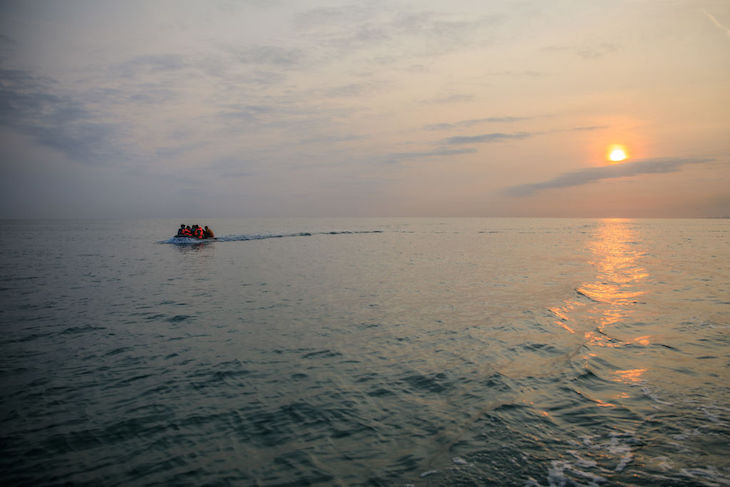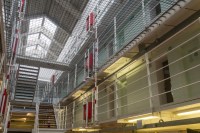‘Have you got a light mate?’ The shout came from the top of the slipway on Deal beach. Bill, who had just arrived on the shore with a boat of migrants, looked up. Between him and the car park, two men were walking towards him. It was 1am, but the bright full moon lit them up like daylight. As Bill passed, worried what the men wanted, he went to pull his fist out of his pocket.
‘ARMED POLICE!’ the man yelled and sprang forward, rugby tackling him. Bill’s face and chest smashed into the pebble-strewn beach and his knees slammed into the hard concrete slipway. All around him crowded black-clad armed men. Bill lay there, too shocked to struggle.
‘I am arresting you for conspiracy to facilitate unlawful immigration…’.
In February 2019, a judge sentenced Bill to eight years. It was in prison that our stories overlapped: I was sent to jail in 2020 for fraud. Behind bars, I met Bill, a white Englishman who grew up sailing the Channel with his dad. After school he served in the army, but left disenchanted and started a construction firm. In 2008, it failed and Bill needed money. He’d employed a group of Albanians as steel fixers. One of those men, Artan, dealt cannabis, handled counterfeit Euros and smuggled people.
Pursuing his secret missions across the Channel fulfilled Bill’s need for a purpose
Artan offered Bill a proposal to go into business: ‘You’re British, you’ll be fine. They won’t suspect you.’
Bill had no problem with illegal migration. He didn’t see why one man should be born with more opportunities than another, so he said yes. His job was to bring one migrant at a time onto a ferry. Each man paid £6,000 for the trip, with Bill receiving £3,500. He drove to Dover and took the ferry to Dunkirk where security was lax. From there, Bill drove to Brussels’ red light district. The first migrant, a man from Kuçi, Artan’s home town, had been smuggled into England several times before.
Bill drove migrants onto the ferry in the boot of his car. Once on board he told the men to climb onto a lorry. The lorries were searched before boarding in France, while the UK typically searched returning cars at Dover.
After six months, having smuggled over 25 migrants into the country, French police searched Bill’s car and found a Sri Lankan man. They charged Bill and bailed him. While Bill awaited trial he stopped smuggling. Artan continued, until a migrant jumped off a lorry to avoid paying. Tragically the migrant’s foot got stuck and when the lorry pulled off the man suffered horrific injuries.
Bill went back to France, where he was sentenced to six months’ imprisonment. Meanwhile, British police arrested Artan and he got seven years.
Shortly after Bill’s return to the UK, a nondescript middle-aged man and woman visited the house he shared with his fiancee, Caroline. The man showed Bill a list of all his ferry bookings. Then the woman spoke: ‘Help us or it’s prison for a lot longer than six months.’
The trip would be Bill’s last
Bill was reluctant about co-operating but ultimately their threats proved meaningless. In 2014, they cut him loose. A year later, Bill met up with Artan, who had been released from prison in 2012. Security had tightened on the ferries, so they needed a new plan. ‘Why don’t we sail them over? From a nice quiet marina, no drama,’ Bill asked.
Bill moored at Brightlingsea in Essex and spent time with the locals until they accepted him. Artan rented a house in Paris where migrants stayed until a cab brought them to the north coast of France: Gravelines, Grand-Fort-Philippe or Les Hemmes d’Oye. Four Sri Lankan or Vietnamese men at a time, each paying £15,000 for the trip, of which Bill kept £7,500. They boarded the boat at night. Back at Brightlingsea, they waited until night to disembark.
Over three years, Bill smuggled over 100 men into Britain and made good money. He and Caroline had two daughters. Bill said he never felt more free than when smuggling people across the Channel.
But things would soon go wrong. The boat had to be replaced with a fast, sleek rigid inflatable boat (RIB). Then some migrants disembarked in daylight, and the men at Brightlingsea told Bill he wasn’t welcome any more.
Bill went straight, started a new construction firm. But, in 2018, Bill and his business partner were short of cash so they had Artan arrange a job.
The trip would be Bill’s last. He kissed Caroline and their daughters goodbye at 4pm on 2 August 2018 then drove to Whitstable. At 6pm, Bill put the boat in the water, while his partner drove the trailer to Deal in Kent. Once the sun set, Bill turned to sea and set out for Gravelines. On his own, with no lights, making 19 knots, and with the tide carrying him, Bill felt great.
Around 11pm, Bill moored at Gravelines. Four Vietnamese men leapt aboard. Bill took them out into the Channel. The tide carried them back towards England, and with the sea flat calm it seemed easy.
They reached Deal after midnight, and Bill’s partner led the migrants away. He just had to pilot to the ramp, bring the trailer down, load the boat, and get home. Bill’s judgement was off but eventually he found the ramp and moored. Ashore, he lit a cigarette to calm his nerves. It was then he heard the shout from the top of the ramp.
In prison, Bill often thought about why he became a people smuggler. The money was good but it was the sense of freedom and adventure that drove him. Bill felt the Army let him down, but pursuing his secret missions across the Channel fulfilled the same need for purpose. The people Bill smuggled were almost all young men. Bill believes most were economic migrants, determined to find a better life at any cost. He’s proud that he always used a proper boat, and took the risk alongside the migrants. Perhaps also, Bill recognised bravery and longing for adventure in the young men he brought to the UK.
Bill’s out of the business for good. His conviction cost him years of his life and his family. But Bill knows that people smuggling isn’t going away. The money’s too good, and even deportees pay to come back time and again. Without a fleet of small boats patrolling the Channel or less opportunity for illegal migrants in Britain, the smuggling business will never end.
Bill, Artan and Caroline’s names have been changed






Comments